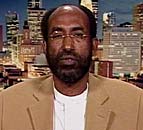MARGARET WARNER: So if all of this is the case, Secretary Cohen, then why is the U.S. government apparently -- though they've never confirmed that the U.S. has been supporting the warlords financially -- why is the U.S. so concerned about this Islamic group?
HERMAN COHEN: I think the U.S. government panicked. They saw Islamic group; they said, "Taliban is coming."
Also, there are friends in the region, like the Ethiopians, who probably are feeding false intelligence about terrorists being hidden and that sort of thing, because the Ethiopians are deadly afraid of Moslem control and also they have their own Moslem problem among the Oromo ethnic group in Ethiopia.
So they want to keep the Islamists out of power, and they will bring the U.S. into it, if they can.
MARGARET WARNER:
|
 Abdi Samatar Abdi Samatar
University of Minnesota
"What they want to do is create the conditions in which the Somali people, and particularly the people of Mogadishu and the Banadir region, could be able to have determination as to which way they want to go."
|
Now, though you heard the president still express some concern about whether it will become a safe haven for al-Qaida-style terrorists, how great a danger do you think there is of that?
HERMAN COHEN: I think it's minor, because the people in the Islamic movement saw what happened to the Taliban and they don't want the same thing to happen to them; that's why this letter that came out in your presentation earlier is saying, "Don't worry. We're not going to have any of these folks here. Don't start fighting with us."
And I think that's right, because the first thing they need to do is consolidate power where they are. They don't want to get into a fight with the United States.
MARGARET WARNER: But, Professor, the same leader who wrote that conciliatory letter to the international community about not harboring terrorists also was quoted as saying at this rally today, "We won't stop until we've established an Islamic state throughout Somalia." He talked about Sharia law.
Is this group determined to impose a very strict form of Islamic rule, theocracy, if you will, in Somalia?
ABDI SAMATAR: I think Somalis have always been moderate practitioners of Islam and very, very free people. The same gentleman, Sheikh Sharif, also noted today that they are not interested in becoming ministers or government themselves -- that's the Islamic courts -- and that they will be using the Sharia law until such a time when a constitutional government is formed.
I'm not too concerned that they will be able to impose the kind of draconian rules that the Taliban's or anybody of that ilk have done to their people.
What's relatively very refreshing about this group is the fact that they have committed themselves to say that they are not interested in becoming ministers; they are not interested in becoming government, but what they want to do is create the conditions in which the Somali people, and particularly the people of Mogadishu and the Banadir region, could be able to have determination as to which way they want to go.
That's quite refreshing. We have not seen that in any group of movement who have taken over a city anywhere in the world, whether they are religious or secular.